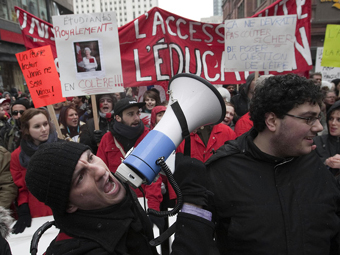|
Glorious weather helped lend a joyous and carnivalesque atmosphere to
the massive demonstration that wound its way through the streets of
Montreal on March 22. One protester carried a sign that read "Printemps
Érable,"
a uniquely Quebecois play on the French for Arab Spring (printemps
arabe) that translates as "Maple Spring." The elation of that enormous outdoor
party with its sea of red must have contributed fleetingly to a feeling
of impending triumph. But as the more typical cold of a real Quebec
spring returned in the days that followed, so a mood of hard work and
desperation returned to the strikers. Posters have gone up around the
UQAM campus exhorting the boycotters not to give up, but the temptation
to do just that must be growing daily.
 Many students, of course, were never on board with the protests to begin
with, but lacking a formal organization and unified message, their
actions get less attention. Nevertheless, Laurent Proulx, a student at
Université Laval, did make headlines when he went to the trouble of
seeking and winning a court injunction against the students who were
blocking access to his anthropology class.
Many students, of course, were never on board with the protests to begin
with, but lacking a formal organization and unified message, their
actions get less attention. Nevertheless, Laurent Proulx, a student at
Université Laval, did make headlines when he went to the trouble of
seeking and winning a court injunction against the students who were
blocking access to his anthropology class.
Last week, the Université du Québec à Montréal finally sought a legal
injunction against the students who have several times blocked access to
entire buildings on campus. At McGill, students have illegally occupied
administration buildings. In a particularly bizarre move, a group of
protesters held the staff of the Montreal Economic Institute captive in
their offices, presumably to register their discontent at the enormous
influence the free-market think tank wields in the corridors of
provincial power...
One hears people say that the decision to walk out of classes was taken
democratically by the student organizations, and therefore no student
can legitimately attend classes while the strike continues. But of
course the students have not entered into anything like a contractual
agreement to respect the decisions of the general assemblies of their
student unions, much less the decisions of their union executives. For
all the bluster of the student organizations, they simply are not that
kind of organization.
The frustration of students like Laurent Proulx highlights a key aspect
of the "strike" that deserves serious scrutiny. The strike is not a
strike at all: it’s a boycott. Nothing therefore should prevent students
who have not consented to the action from attending their classes, and
of course nothing should prevent professors from giving those classes.
But they are prevented, and often by force, by the "strikers."
|

